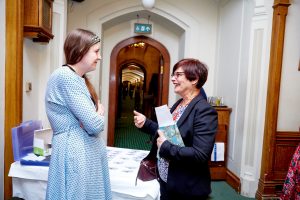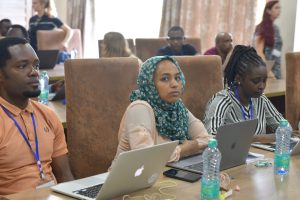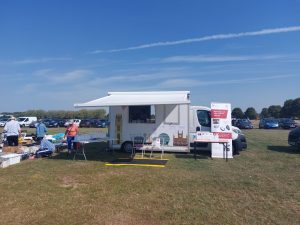A post first published on the PsyPost blog interviewed IEU researcher Chloe Slaney about a new paper exploring associations between chronic low-grade systemic inflammation and cognitive function.
Author: IEU admin
The Data Hazards of mental health prediction
In a post first published on The Scholarly Kitchen blog, Nina Di Cara and Claire Haworth discuss the Data Hazards project and how it is being applied to improve how data ethics are identified and communicated in mental health research. (more…)
A dashing dabble in democracy: An epidemiologist’s week with the Royal Society pairing scheme
Maria Sobczyk shares her experience of being part of the Royal Society pairing scheme, which links scientists with people at the heart of UK policy making
“Yes, Minister” – truth, fiction, or something in between? I have always been fascinated by the inner workings of politics. So, when an opportunity arose to combine this interest with my role as a post-doc in health data science, I promptly applied for the 2023 edition of the Royal Society pairing scheme, which offers a week-long experience in Westminster.

Immune cells as biomarkers of depression
Éimear Foley discusses a new systematic review examining links between inflammation and depression.
Depression is an illness that is estimated to affect around 10-20% of the world’s population in a lifetime. However, for many people, current treatment strategies do not work sufficiently well. Depression is a multifactorial condition and there is mounting evidence that several biological and non-biological mechanisms may be at play.
One aetiological factor of increasing interest is inflammation. Prof Golam Khandaker, Head of the Immunopsychiatry Programme at the University of Bristol’s MRC Integrative Epidemiology Unit, tries to illustrate this point by asking people to think of the symptoms they experience when they have a cold or flu. Along with a runny nose and a cough, people often experience fatigue, a change to usual appetite or sleeping patterns, and/or a reduced ability to experience pleasure. He points out that these are also typical symptoms of major depressive disorder. Moreover, were you to have a blood sample taken, you would also find evidence of high levels of inflammation due to the activation of an immune response. Recent research suggests that up to a quarter of all depressed patients consistently show evidence of inflammation in their blood, as defined by C-reactive protein levels. Other studies have supported these findings, showing that depression may be causally linked to elevated concentrations of proinflammatory cytokines (i.e., proteins often used as markers of inflammation), like interleukin 6.
World Cancer Day – An interview with Professor Richard Martin discussing interdisciplinary cancer research
Richard Martin was interviewed by Caroline Bull, Associate Editor of PLOS ONE, in a post that was first published on the EveryONE blog.
World Cancer Day, held every 4 February, is a global initiative led by the Union for International Cancer Control (UICC) to raise awareness, improve education and catalyze action. This year’s theme is ‘Close the Care Gap: Uniting our voices and taking action’.
Each year, PLOS ONE publishes more than 1000 cancer-related research articles from authors across the globe. In celebration of this year’s theme, we interview PLOS ONE author Richard Martin, Professor of Clinical Epidemiology at the University of Bristol and co-lead researcher of the Integrative Cancer Epidemiology Programme. We ask how Open Science can contribute to interdisciplinary cancer research and how engagement with patient communities has increased the impact of their research. (more…)
Genetic epidemiology for African scientists
By Emma Anderson, Apostolos Gkatzionis, Lucy Goudswaard, Ruth Mitchell, Chin Yang Shapland, Kaitlin Wade and Venexia Walker
In recent years, there has been an explosion of research in Mendelian randomization (MR). It is a useful tool for inferring causality between exposures and outcomes of interest using genetic data. The Mendelian randomization conferences organised by the MRC Integrative Epidemiology Unit (IEU) regularly provide an opportunity to explore these issues.
In 2018, one of the conference attendees was Dr. Sarah Atkinson from Kemri Wellcome Trust in Kilifi, Kenya. As the conference progressed, she began chatting with Dr Ruth Mitchell and the idea emerged of IEU hosting an MR course for African scientists. Sarah applied and was awarded funding from the Wellcome Trust, which was supplemented by the IEU, to host six experts in MR from the IEU to teach a five-day course on Mendelian randomization to African researchers in Kilifi. (more…)
Helping the public explore key health questions
By Emma Hazelwood and Amy Campbell
‘What do you think is most important for our health – our genetics or the environment we live in; nature or nurture?’
This was a key question that we posed to members of the public as part of a roundtable discussion on the topic of “Inherited Health”. We hosted our roundtable as part of the recent FUTURES public engagement festival and our event was attended by approximately 25 members of the public including retired professors, patent lawyers, and civil servants. (more…)
Involving the public with health research: in conversation with epidemiologists
Seed funding from Elizabeth Blackwell Institute enabled three researchers to develop their projects by including the ideas and experience of patients and the public. Article by Barney Marsh, originally published here. (more…)
How cakes can support charity, community and collaboration
Earlier this year we began to hold monthly bake sales to raise money for charity and to provide a new social space to engage with colleagues. Siân Harris explains.

Involving the public in research: taking the mobile lab on the road
Amy Campbell, Hannah Sallis & Robyn Wootton
How do you feel about researchers tracking your mood using technology? How about tracking your physical activity or your sleep? How much technology will we let into our lives in the name of research?
 These were the questions being asked this summer, when a team of researchers (from Bristol, Manchester, London and Oslo) went to speak to members of the public. They took the University of Bristol’s mobile lab around the city of Bristol and surrounding areas, to festivals, community groups and local parks. They wanted to understand public perceptions towards the use of technology to monitor mood and behaviour throughout the day, whether or not this was acceptable, and how to involve a diverse group of people in their research. In this blog post they tell us about what they did and what they found out. (more…)
These were the questions being asked this summer, when a team of researchers (from Bristol, Manchester, London and Oslo) went to speak to members of the public. They took the University of Bristol’s mobile lab around the city of Bristol and surrounding areas, to festivals, community groups and local parks. They wanted to understand public perceptions towards the use of technology to monitor mood and behaviour throughout the day, whether or not this was acceptable, and how to involve a diverse group of people in their research. In this blog post they tell us about what they did and what they found out. (more…)
